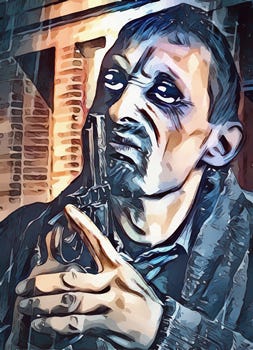From all appearances, Herbert Baumeister was a typical resident of his wealthy Indianapolis suburb. He and his wife Juliana had three children, and ran two successful retail outlets in Indianapolis.
Juliana described Herb as a devoted father who spent plenty of time with his kids. The kids grew up in the park-like setting of the Baumeister estate.
One fine day in 1995, their 15-year-old son found a human skull and some other bones on the grounds, and told Juliana. When she mentioned the unusual discovery to Herb, he assured her that the bones belonged to his father, who was a doctor. Why they happened to be partially buried on the estate was never explained, but what the heck?
Meanwhile, there was an on-going investigation in the Midwest regarding the disappearance of more than a dozen gay men--the first case dating back to 1980.
Based on an interview of almost-victim Mark Goodyear, and an investigation that indicated Herb Baumeister was well known at every gay hangout in Indianapolis, police began a surveillance. Goodyear indicated that victims were lured back to the estate for a bit of sexual asphyxia action. Apparently, Herb's fascination with the ecstasy caused by nearly strangling his prey was later eclipsed by the sheer thrill of just watching the victim die.
How Goodyear survived remains somewhat of a mystery.
Police would have liked to search the property at this point, but voluntary entry was refused. Herb certainly didn't want the cops poking around, and Juliana wasn't buying the accusation of her hubby's double life--just yet. Still, the notion that Herb was a big-time cruiser of gay bars didn't exactly improve their relationship. What's more, with Herbie being a little stressed, he wasn't taking care of business, and things were deteriorating at the stores.
Buried bones and lurid accusations are one thing, but possible foreclosure is a serious matter! Juliana decided to file for divorce, and kick her man out of the house. She also agreed to a search, which yielded hundreds of bones, and bondage paraphernalia. Incredibly, Herb was questioned and released.
Not surprisingly, he fled the scene.
In all, the bones of seven victims were found on the estate. Autopsy data on nine other bodies found along rural roads in Indiana and Ohio pointed to Baumeister's modus operandi. The nine other slayings, committed between 1980 and 1990, had striking similarities: All the victims were partially unclothed, found near water, and most had been strangled. The victims were all from Indianapolis.
Lots of cases could now be marked "solved." Others would be attributed to him.
As for Herb Baumeister, he killed himself in a Toronto park in 1996.
How his wife could not notice that he was frequenting the gay bar scene for years is difficult enough to comprehend. But how she could remain ignorant of seven bodies being buried within a few feet of their home truly boggles the mind. One can certainly speculate that she was at least an accomplice after the fact, but she was never charged.


